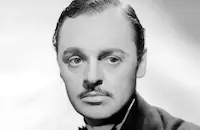Penelope

Brief Synopsis
Cast & Crew
Arthur Hiller
Natalie Wood
Ian Bannen
Dick Shawn
Peter Falk
Jonathan Winters
Film Details
Technical Specs

Synopsis
Although Penelope Elcott's banker husband James is in love with her, he is constantly preoccupied with business. On a whim, Penelope disguises herself as a sweet old lady and holds up her husband's bank for $60,000. She then goes to the ladies' room, removes her disquise, emerges wearing a yellow suit, informs the guards that a little old lady with a gun is in the washroom, and leaves the bank. Afterwards, she goes to her mentally unbalanced psychiatrist, Gregory Mannix, and confesses her history of kleptomania. A concealed camera has photographed the crime and has caught a rear view of the yellow-suited woman leaving the bank. Police Lieutenant Bixbee begins to suspect Penelope when he notices that the little old lady and the yellow-suited woman in the film have the same walk as she does. Penelope disposes of the yellow suit in a thrift shop, and it is purchased by Sadaba, who runs a fashion boutique. Sadaba learns of the suit's significance, and she and her partner, Ducky, try to blackmail Penelope. Penelope confesses to Dr. Mannix, who attempts to return the $60,000 through the bank's night deposit box and, in his haste, leaves the cash exposed. Penelope confesses to her husband when a streetwalker who finds the money is accused of committing the crime. She is forced to take drastic measures to convince him of the truth of her story, but he refuses to press charges. Penelope reforms, having gained the renewed interest of her husband.

Director

Arthur Hiller
Cast

Natalie Wood

Ian Bannen

Dick Shawn

Peter Falk

Jonathan Winters

Lila Kedrova

Lou Jacobi
Norma Crane
Arthur Malet

Jerome Cowan

Arlene Golonka
Amzie Strickland
Bill Gunn
Carl Ballantine
Iggie Wolfington
Crew
Preston Ames
Maryce Bates
Leslie Bricusse
George W. Davis
Gale Garnett
Keogh Gleason
Henry Grace
Sydney Guilaroff
Edith Head
Ann Landers
Arthur Loew Jr.
Franklin Milton
Terence Nelson
Joe Pasternak
Rita Roland
Harry Stradling
William Tuttle
Robert Vreeland
George Wells
Johnny Williams
Johnny Williams

Film Details
Technical Specs

Articles
Penelope - Penelope
Pasternak had been one of the studio's leading producers of frothy star vehicles and musicals, but his kind of film was passé in the swinging 60s. Still, he spared no expense for Penelope, hiring Edith Head to provide his star with a $250,000 wardrobe. Wood's glamorous costumes were such an important selling point for the film, in fact, that the closing credits featured a fashion show of Wood in deleted scenes featuring even more outfits.
With a million bucks spent on star and wardrobe, there wasn't much money left for important co-stars, which turned out to be one of Penelope's accidental assets. British actor Ian Bannen was suitably stodgy as the husband, and several terrific comic and character actors in supporting roles provided some of the film's best moments. Peter Falk's earthy detective was a warm-up for his "Columbo" character, who would first appear in a 1967 TV movie, and would settle into a long and profitable run as part of a rotating series of detective shows in 1971. Jonathan Winters contributed a manic three-minute bit in Penelope, and Dick Shawn was funny as a neurotic psychiatrist. Lou Jacobi and Lila Kedrova were also memorable as a pair of blackmailers.
In spite of the film's lighthearted story, Wood was in a fragile emotional state. She later recalled the making of Penelope as one of the most difficult experiences of her career. "I broke out in hives and suffered anguish that was very real pain every day we shot. Arthur Hiller, the director, kept saying, 'Natalie, I think you're resisting this film,' while I rolled around the floor in agony." Maybe some of that agony showed onscreen. Critics had little good to say about the film, or about Wood's performance. "Lavish and laughless," wrote Judith Crist in the New York World Journal Tribune. "Natalie Wood is not a comedian. She is a title-roleist." The best the Variety critic could come up with was "'cute' in the best-accepted use of the term....Natalie Wood does a nimble job and turns in a gay performance as well as being a nice clothes-horse for Miss Head's glamorous fashions."
Thanks to Wood's popularity, Penelope was booked at Radio City Music Hall, and broke opening day records there. But bad reviews and word of mouth quickly changed that, and the film fizzled at the box office. Wood's depression worsened, and she withdrew from the public eye, undergoing intensive psychotherapy. She would not make another film for three years. However, by 1969, she was involved in a new romance with agent Richard Gregson, whom she would eventually marry, and her comeback film, Bob & Carol & Ted & Alice (1969) had become a huge hit, and one of the defining films of the culture of the era.
Director: Arthur Hiller
Producer: Arthur M. Loew, Jr.
Screenplay: George Wells, based on a novel by E.V. Cunningham
Cinematography: Harry Stradling
Editor: Rita Roland
Costume Design: Edith Head
Art Direction: George W. Davis, Preston Ames
Music: John Williams
Principal Cast: Natalie Wood (Penelope Elcott), Ian Bannen (James B. Elcott), Dick Shawn (Dr. Gregory Mannix), Peter Falk (Lt. Bixbee), Jonathan Winters (Prof. Klobb), Lila Kedrova (Sadaba), Lou Jacobi (Ducky).
C-97m. Letterboxed. Closed captioning.
by Margarita Landazuri

Penelope - Penelope
Quotes
Trivia
Miscellaneous Notes
Released in United States Winter January 1, 1966
Released in United States Winter January 1, 1966














